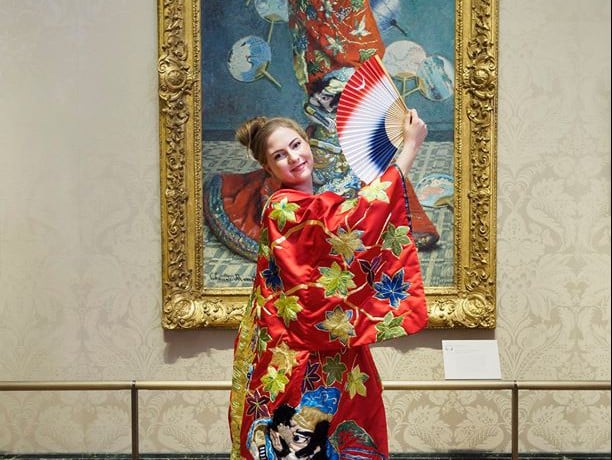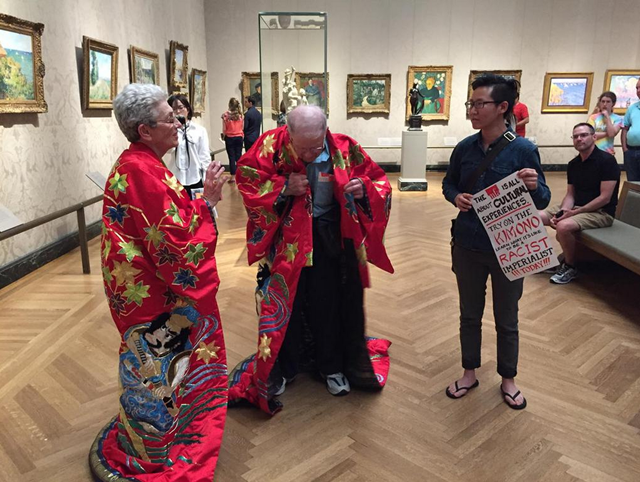Art World
Asian Americans Defend Boston MFA Over Kimono Event As Debate Rages On
The aggrieved could have claimed victory, but they're not satisfied.

Photo Museum of Fine Arts Boston, via Facebook.
The aggrieved could have claimed victory, but they're not satisfied.

Brian Boucher


A protester at the Museum of Fine Arts Boston.
Photo: via Amber Ying, Twitter.
Protestors against a kimono try-on event at the Museum of Fine Arts Boston are upping the ante. They have issued an extensive list of demands, following an apology on the museum’s website.
The dustup began when the museum organized a recurring gallery event, “Kimono Wednesdays,” in which visitors tried on a Japanese-made replica robe while standing in front of a Claude Monet painting of his wife wearing a formal kimono.
Several protestors took to the gallery during the event, decrying what they classify as racism, cultural insensitivity, and cultural appropriation.
This was plainly a publicity stunt that went horribly awry. When an internal memo with talking points for staffers, including the defense “We don’t think it’s racist,” was leaked to protesters, it made matters worse.
In its defense, the museum points out that it was the first to establish a Japanese collection in the US and to appoint a curator who specialized in the area—in 1890, no less. It boasts nearly 4,000 paintings and upward of 30,000 ukiyo-e prints, one of the largest collections of its type in the world. Distinguished donors like Leonard Lauder have made gifts to the museum, which has sent its treasures to tour art institutions throughout Japan.
The MFA, in the wake of the protests, apologized and canceled future kimono try-on events on Tuesday, but said it would keep the kimono on view for visitors to handle, as an educational offering.
At this point, it would have been easy for the aggrieved to move on. But neither the apology nor the cancellation satisfied the protesters.
The new “list of demands and charges” from the group, which calls itself Stand Against Yellow Face @ the MFA, is nearly 2,000 words in length. They group is offended by everything from the prospect that the MFA planned to curate the photos resulting from the event for its Facebook and Instagram accounts to the fact that the robe, they say, is an uchikake, not a kimono. (An uchikake is a formal variety of kimono, or outer robe, used in wedding ceremonies.)
They demand that the museum apologize not only on its website but via “multiple media outlets and on social media” and that it explain “why this event is unacceptable.”
They also require that “Kimono Wednesdays” be stopped altogether; that public talks titled “Flirting with Exoticism” be renamed; and that didactic materials be edited so that “the history of art” be “properly acknowledged and framed.”
They place their complaints in the context not only of stereotypes like Mickey Rooney’s buck-toothed character in Breakfast at Tiffany’s but also of Black Lives Matter protests over institutionalized racism and police brutality. Notably, they do not mention Japanese internment camps during World War II. US nuclear attacks against Japan don’t come up either.
“By choosing a painting of a European woman to highlight and to invite the public to dress in her ‘kimono,’” they write, “the MFA is continuing in this tradition of exoticizing the ‘East’ through the lens of a misogynist White patriarchal West while contributing to the invisibilization and erasure of the AAPI [Asian American and Pacific Islander] experience.”
“Cultural Appropriation is simply a manifestation of Institutional Racism,” they assert. “Orientalism is a branch of it.”
Five organizers sign the list: they call themselves Xtina, Ames X, Amber Ying, Pampi, and Loreta Paz Ansaldo.
News outlets from the Boston Globe to the BBC and the New York Times have taken notice of the fracas.
But, interestingly, Asian-Americans are not united on whether the event is even culturally insensitive, much less racist.
Japanese-American blogger Keiko K., for her part, has published an epic blog post of her own defending the event. Thoughtful and extensively sourced, it’s nearly 5,000 words, and well worth a read.
“I feel like the word ‘racist’ gets thrown around far too easily,” she writes, and refers to the OED’s definition (showing or feeling discrimination or prejudice against people of other races, or believing that a particular race is superior to another) to let the MFA off the hook on that charge.
“Yellowface” isn’t in the OED, she adds, but referring to its definition of blackface, which refers to patronization of blacks by those who are “insincerely or ineffectively nonracist,” she gives the museum a pass there too. She writes,
If you accept that La Japonaise was Monet’s commentary on japonisme it would seem that what the MFA is actually inviting the public to do is to pretend to be a white woman who is obsessed with Japanese culture which I find ironic. They are not inviting the public to pretend to be Japanese. I understand that subtlety may be lost on most museumgoers but this is why I don’t think it can be characterized as yellowface.
She also points out that “kimono try-on is an established part of Japanese cultural sharing.” She adds that Japanese craftsmen custom-created the kimono, which she interprets as granting permission for the MFA to hold the event.
She goes on,
I’m not so sure the Japanese take La Japonaise that seriously. San-X produced a dango-wielding La Japonaise Rilakkuma stuffed animal with a duck warrior on the kimono to sell at the museums in Japan where Looking East [a traveling museum show] was exhibited (via RilakkumaLifestyle). It’s sort of an absurd art mirroring life mirroring art—the French borrowing from the Japanese who have borrowed it back and made it something kawaii.
She allows that for visitors to don the kimono who don’t know anything about the painting, its context, or Japanese culture, it might be “culturally appropriative,” but doesn’t find that troubling enough to cancel the event.
“All but one of the Japanese and JAs [Japanese-Americans] I talked to said they didn’t feel the MFA’s events were offensive or racist,” she writes. “The one JA who was offended said he couldn’t get worked up about it.”
Far more of the people she polled, she said, were deeply offended by passages in Supreme Court Justice Clarence Thomas’s dissent on the court’s recent gay marriage ruling. He asserted that slavery in America and WWII-era internment camps didn’t deprive blacks or Japanese people of their dignity because dignity is innate, and not the province of government to grant or deny. By his logic, gay marriage is bad, but slavery and internment camps are not so bad.
Now that’s something I think we can all get worked up about.